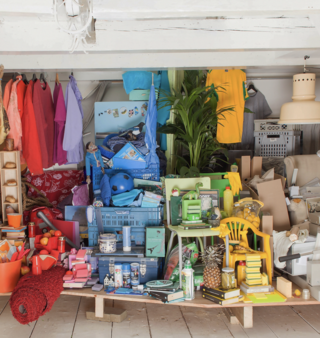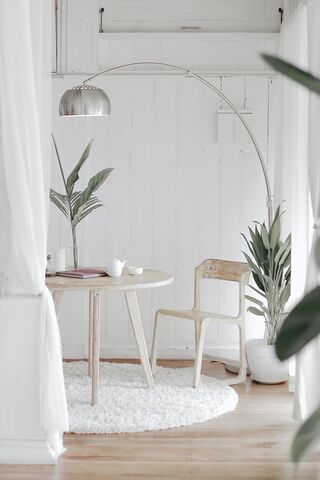Self-Help
Two Actions That Will Simplify Your Life
No need for another self-help book—do this and life will be easier and happier.
Posted September 4, 2020 Reviewed by Abigail Fagan

While the world seems busy and complicated, my home life is actually quite calm and peaceful most days. Maybe you too are feeling that the slowing down of life due to COVID-19 (which for me includes less travel, less running around, and less socializing) brings both burdens and blessings.
In the midst of all this, my Sweetie and I merged houses and have found piles of redundancies filling our closets and shelves. And this occurred just at the time when the pre-COVID plan was to sell this house and move somewhere new. We now find ourselves considering if moving or just enjoying our current home makes the most sense. We don’t know. But we do know that having piles of redundant items isn’t necessary and that there is a lot of opportunity for us each to simplify during this time of “not knowing what is next.” Spiritually as well as practically, simplifying makes a lot of sense. But where do you begin?
Action 1: Give stuff away.
There are many different strategies for how to sort things and give extra items away. Believe me, I have the books to prove there are lots of ways to do this. But the truth is that only two things are essential to make this happen.

Set aside time to sort. Some people say to set aside days for this process, but I have found setting aside 15 minutes a day to be remarkably helpful over time. Decluttering expert Stephanie Robinson from Squared Away Today advises to listen to what works for you.
Create a “rule” or “guiding principle” to assess what to keep and what to lose. I like Marie Kondo’s, “does this spark joy?” myself (Kondo, 2014). But another option is to ask “is it necessary, is it beautiful, does it improve my life?” I am not sure if the words matter so much as knowing your key question and using it.
Of course, you don’t have to just give stuff away to simplify; you can give away habits, distractions of mind, relationships that don’t work, ways in which you may be wasting time. The list is probably endless of the “stuff” we can give away. But even if we do this with earnest commitment, it will not be enough unless we also take the second action to simplify our lives.

Action 2: Stop acquiring more stuff.
While this may seem obvious, let me just say that I sometimes find myself well into Action 1 and totally oblivious to Action 2, which requires me to stop buying stuff. Here are a few simple ideas for how to break the habit of buying (if you have such a habit) and move joyously into a simpler way of life.
Avoid getting advertised to. This sounds easy but it's actually super hard in the modern era. Everyone wants to sell you something. News sites, most social media (Facebook, Instagram, etc.), and even old fashioned mailed catalogs constantly are telling us we need more or are enticing us to consider buying more. They are the nicotine of the modern area. Try to minimize them as much as possible.
Observe how buying makes you feel. During this time of increased uncertainty and stress, it is easy to get addicted to the pleasure of buying — even if it is a fleeting sensation. Think about how often you are shopping after reading stressful news (or while listening to it). Is buying an antidote to the pain of daily life? Mindfully recognizing your consumption patterns and the “hit” of buying can be a powerful way to interrupt the addiction (Brewer, 2019).
Find new pleasures. The evidence is strong that resisting unhealthy habits doesn’t really work, so new habits have to form to replace the unwanted (Baumeister, Heatherton, & Tice, 1994; Erskine, 2008). What can we do instead of browsing new purchases or following the link to the cute dress that got me on Facebook “clickbait”? One option is to focus our attention on nature, art, people, and nurturing stories. Another option is to choose activities other than shopping to reduce stress and bring pleasure.
Conduct a Buying Boycott. There are many ways to do this, but the simplest is to do the following for 3, 6 or 12 months: (1) Commit to not buying things (e.g., clothes, books, new lounge chairs, etc.); (2) make exceptions to buy something that breaks or wears out (and get rid of what it will replace!), consumables (e.g., food, toilet paper, etc.) and maybe gifts for others. I will admit that I personally added the exception of buying hobby related supplies such as paint or canning jars last time I did this, but be careful because that can be a slippery slope.
Bottom line: Simplifying may involve breaking attachments and the emphasis on "more"

As with most things, simplifying our lives is actually easy and can be done without taking classes, reading books, or buying something new. Commitment and maybe a friend (to do this with) are all that is needed. And, at the same time, to simplify for most of us will mean breaking deep attachments to things we own and addictions to acquiring more. The gift is to not only renew physical space and the opportunity to travel more lightly in the world but to renew our mindset and perhaps even our heart’s content.
Facebook image: fizkes/Shutterstock
References
Kondo, M. (2014). The Life-Changing Magic of Tidying Up: The Japanese Art of Decluttering and Organizing. New York: Ten Speed Press. ISBN 978-1607747307.
Brewer, J. (2019). Mindfulness training for addictions: has neuroscience revealed a brain hack by which awareness subverts the addictive process?. Current Opinion in Psychology, 28, pp.198-203.
Baumeister, R.F., Heatherton, T.F., Tice, D.M. (1994). Losing control: How and why people fail at self-regulation. San Diego, CA: Academic Press.
Erskine, J.A.K. (2008). Resistance can be futile: Investigating behavioral rebound. Appetite, 50, 415–421.




